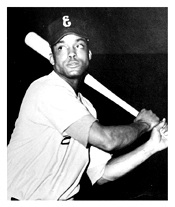“The Giants did talk about signing me in 1945. It was right around the same time as Jackie. But I wasn’t ready then. I had just gotten back from the war. I could have been first, I think. I could have handled it. But it wasn’t meant to be.”
In one chapter of The Soul of Baseball by Joe Posnanski, Buck O’Neil spent a day with Monte Irvin. Irvin holds a very unique position in baseball history as the only player to be a full-fledged star in both the Negro Leagues and the integrated major leagues.
As he lamented in the book, Irvin was like so many other Negro Leaguers who despised the date of their birth because they were denied a full career in the major leagues. But Irvin surely understood the importance of his timing, and his place in baseball history. No other player could serve as such a measuring stick of the Negro Leagues and provide a witness to the players he’d played against.
Despite missing two years to World War II, Irvin was elite in the Negro Leagues throughout his 20s. After a short adjustment, he was elite in the majors in his 30s. His successful transition was a testament to what other Negro Leaguers were capable of. And having seen what it took to make it in both environments, Irvin’s testimony about other players carried special weight.
What Irvin could understandably resent was the timing of the war. Not only did service in the European Theater rob him of two seasons during his youth, but it took his sharpness and affected his confidence. According to Cool Papa Bell, before Irvin left for the war in 1943, he was the best player in the Negro Leagues. But an inner-ear condition developed during the war hampered his superb coordination and left him uncertain of his skills. When the Giants and Dodgers reportedly asked how he would like to integrate the major leagues, Irvin declined.
While we are all indebted to Jackie Robinson for leading the integration movement, we are indebted to Monte Irvin for providing the best testament to the general equality of the majors and the Negro Leagues.
If a man 32 years of age with an inner-ear condition and a ton of wear and tear from the Negro League experience and military service can tear up the majors like Monte Irvin did in 1951, then imagine what he could have done in his 20s without a war and segregation to hold him back.
You can join in remembering the men of the Negro Leagues by reading The Soul of Baseball. The Topeka & Shawnee County Public Library is sponsoring a community read of the book, and has dozens of copies available. I will participate in a group discussion of the book on Feb. 16. Then Posnanski will be at the library on Feb. 17 to talk about O’Neil, the book and his experiences.
